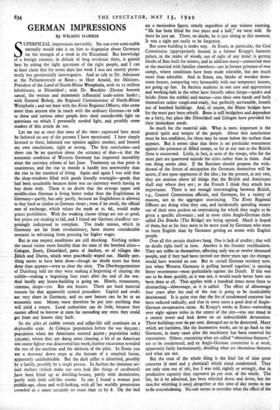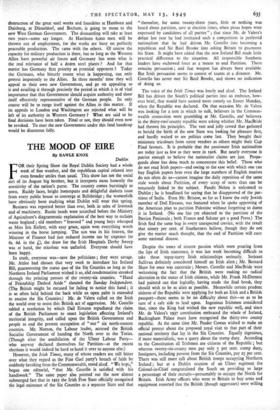GERMAN IMPRESSIONS
By WILSON HARRIS
SUPERFICIAL impressions inevitably. No one even semi-stable mentally would take it on him to dogmatise about Germany on the strength of a week in the Rhineland. But knowledge of a foreign country, in default of long residence there, is gained best by asking the right questions of the right people, and I can at least claim that for seven days last week I was not merely persis- tently but pestilentially interrogative. And to talk to Dr. Adenauer at the Parliamentrath at Bonn ; to Herr Arnold, the Minister- Prasident of the Land of North-Rhine Westphalia, with its 12 million Inhabitants, at Diisseldorf ; with Dr. Boeckler (Doctor honoris causa), the veteran and immensely influential trade-union leader ; with General Bishop, the Regional Commissioner of North-Rhine Westphalia ; and not least with the Kreis Regional Officers, who come more than anyone else in touch with the ordinary German—to talk to these and various other people does shed considerable light on questions on which I personally needed light, and possibly some readers of this article do too.
Let me say at once that none of the views expressed here must be fathered on any of the persons I have mentioned. I have simply listened to them, balanced one opinion against another, and formed my own conclusions, right or wrong. The first conclusion—and there can be no question about the accuracy of that—is that the economic condition of Western Germany has improved incredibly since the currency reform of last June. Testimony on that point is unanimous, and the rise in morale is hardly less noteworthy than the rise in the standard of living. Again and again I was told that the shop-windows filled with goods literally overnight—goods that had been unsaleable because there was no currency worth having to buy them with. There is no doubt that the average upper and middle-class German is living better today than the Englishman in Germany—partly, but only partly, because no Englishman is allowed to buy food or clothes in German shops ; even if he could, the official rate of exchange, which values the mark at Is. 6d., would make prices prohibitive. With the wonking classes things are not so good, but prices are tending to fall, and I found my German chauffeur sur- prisingly indisposed to complain. The trade unions, which in Germany are far from revolutionary, have shown considerable restraint in refraining from pressing for higher wages.
But in one respect conditions are still shocking. Nothing strikes the casual visitor more forcibly than the state of the bombed cities— Cologne, Essen, Diisseldorf, parts of Aachen, or of villages like Jiilich and Duren, which were practitally wiped out. Hardly any- thing seems to have been done—though no doubt more has been done than appears—even to clear the sites. The Oberburgermeister of Duisburg told me they were making a beginning of clearing the rubble—making a beginning four years after the end of the war. And hardly any house-building is going on. Hotels, restaurants, cinemas, shops—yes. But not houses. There are hard material reasons for that apparently cynical procedure. Capital and credit are very short in Germany, and no new houses can be let at an -economic rent. Money must therefore be put into anything that will yield a return. Local authorities can do little, because they cannot afford to borrow at rates far exceeding any rents they could get from any houses they built.
So the piles of rubble remain and cellar-life still continues on a deplorable scale. At Cologne (population before the war 650,000 ; population when the Americans entered 4o,000 ; population today 550,000), where they are doing some clearing, a bit of an American one-seater fighter was discovered last week; further excavation revealed the rest of the machine and the skeleton of the pilot. In Essen you see a doorway down steps at the bottom of a smashed house, apparently uninhabitable. But the dark cellar is inhabited, possibly by a family, possibly by a single person. In Aachen the immense air- raid shelters (which make our own look like things of cardboard) bave been fitted up as dwelling-houses, partly with dormitories, partly with little cell-like rooms. In one I found a woman past middle-age, clean and wzil-looking, with all her worldly possessions crowded in a since certainly no more than 12 by 8. On the bed
sat a motionless figure, utterly regardless of any visitors entering. "He has been blind for two years and a half," we were told. So there he just sat. There, no doubt, he is just sitting at this moment. It was a sight not easily to be forgotten.
But some building is under way. At Essen, in particular, the Coal Commission (appropriately housed in a former Krupp's fantastic palace, in the midst of woods, out of sight of any mine) is getting blocks of flats built for miners, and in addition many—unmarried men or the married with families elsewhere—are in former prisoner-of-war camps, where conditions have been made tolerable, but not much more than tolerable. And in Essen, too, blocks of wooden three- room houses, comparing very favourably with our temporary houses, are going up fast. In Aachen students in one case and apprentices and working-lads in the other have literally taken things—spades and bricks (from the rubble) and mortar—into their own hands and built themselves rather rough-and-ready, but perfectly serviceable, hostels out of bombed buildings. And, of course, the Rhine bridges have for the most part been rebuilt Bonn is still bridgeless and dependent on a ferry, but place like Dusseldorf and Cologne have provided for their immediate needs.
So much for the material side. What is more important is the general spirit and temper of the people. About that conclusions must be less confident, for there may be more below the surface than appears. But it seems clear that there is no particular resentment against the presence of Allied troops, so far at any rate as the British Zone is concerned. Little, in fact, is seen of the troops, who for the most part are quartered outside the cities rather than in them. And one thing seems clear. If the Russians should propose the with- drawal of the forces of occupation the Germans themselves will be secret, if not open opponents of the idea ; for the present, at any rate, they are anxious above all things that the British and Americans shall stay where they are ; to the French I think they attach less importance. There is not enough intermingling between British, e.g., Control Commission officials, and Germans, for a variety of reasons, not in the aggregate convincing. The Kreis Regional Officers are doing what they can, and incidentally spending money out of their own pockets on entertaining for which they ought to be given a specific allowance ; and in most cities Anglo-German clubs called Die Briicke (The Bridge) are being opened. Much is hoped of them, but so far they seem to be more used by Germans who want to learn English than by Germans getting on terms with English people.
Over all this certain shadows hang. One is lack of credits ; that will no doubt right itself in time. Another is the .frontier rectifications. -They are trifles in-themselves, affecting only ten -or twelve thousand -people, -and if they-had been-carried out three-years ago the changes would have worried no one. But to curtail German territory now, just when Western Germany is pulling herself together; is causing bitter resentment—most particularly against the Dutch. If this was not to be done quickly, as it was not, it would much better have not been done at all. That applies with a hundred times more force to dismantling—demontage, as it is called. The effect of clemontage four years after the end of the war is going to be incalculably detrimental. It is quite true that the list of condemned concerns has been reduced radically, and that in some cases a good deal of Anglo- German co-operation exists. At Krupp's works at Essen—extending over eight square miles in the centre of the city—you can stand in a central tower and look down on an indescribable devastation. There buildings over 6o per cent, damaged are to be destroyed. Many which are harmless, like the locomotive works, are to go back to the Germans, in many cases after the machinery has been removed for reparations. Others, containing what are called "obnoxious features," are to be condemned, and an Anglo-German committee is at work, apparently fairly harmoniously, deciding what are obnoxious features and what are not.
But the crux of the whole thing is the final list of nine great concerns (6 steel and 3 chemical) which stand condemned. They are only nine out of 167, but I was told, rightly or wrongly, that in productive capacity they represent 90 per cent, of the whole. The list, let it be admitted, has been whittled down and down, but the case-for whittling it away altogether at this time of day seems to me tobe overwhelming. No one seems to consider what the effect of the destruction of the great steel works and foundries at Hamborn and Duisburg, at Diisseldorf, and Bochum, is going to mean to the new West German Government. The dismantling will take at least two years—some say longer. At Hambom 6,000 men will be thrown out of employment, for the works are busy on perfectly peaceable production. The same with the others. Of course the capacity for military production is there, but so long as the Western Allies have powerful air forces and Germany has none what is the real relevance of half a dozen steel plants ? And for that matter has Germany first priority as potential opponent ? Today the Germans, who bitterly resent what is happening, can only protest impotently to the Allies. In three months' time they will appeal to their own new Government, and go on appealing to it and assailing it through precisely the period in which it is of vital importance that that Government should acquire authority and show itself effectively representative of the German people. Its only course will be to range itself against the Allies in this matter. If its appeals to London and Washington are rejected what will be left of its authority in Western Germany ? What are said to be final decisions have been taken. Final or not, they should even now be revoked. To start the new Government under this fatal handicap would be disastrous folly.







































 Previous page
Previous page